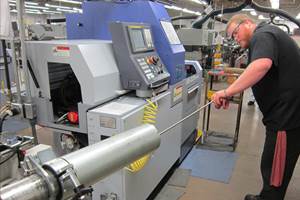A Gold Standard Industrial Engineer
Here’s how to define what we call a “Gold Standard Industrial Engineer.”

A gold standard industrial engineer understands a wide variety of lean tools.
Earlier this year, a friend who owns and serves as chairman of one of America’s largest private manufacturing companies asked me to help him define what we called a “Gold Standard Industrial Engineer.” This is what I told him.
A gold standard industrial engineer understands lean manufacturing and specifically how to identify bottlenecks and constraints in manufacturing processes. Show me someone who has read Goldratt’s “The Goal,” understands its lessons and can put them to practice and I’ll show you someone worth their weight in diamonds in the world of manufacturing. Further, a gold standard industrial engineer understands a wide variety of lean tools.
Gold standard industrial engineers:
- Live by manufacturing metrics. They can measure and identify opportunities to improve throughput, yield, efficiency, productivity, on-time delivery and understand their impact on direct costs and gross profit.
- Understand the technologies that form the foundation of manufacturing, including fluid power, mechanical drives, AC/DC circuits, Ohms Law, materials and material properties. They can speak fluently about injection and blow molding, welding, die casting, machining and fabrication, including stamping, turret and deep draw presses, press brakes and progressive dies. They’re familiar with the processes adjacent to manufacturing operations, including paint, powder coating, ecoating and heat treating.
- Are familiar with robotics and automation, and have the ability to program and operate industrial robots. They can select different robots and end-of-arm tools for each unique application. They are familiar with programmable logic controllers (PLCs), I/O, ladder logic, electric relay control and PLC programming. They understand electric motors, motor control and AC Drives. They can write CNC machine programs.
- Can be relied on to design manufacturing processes, and compare and select equipment. They can calculate return on investment and suggest which capital additions provide the optimum payback. They have advanced understanding of blueprint reading and development.
- Understand process control concepts, including temperature, level, flow, pressure, SCADA and proportional-integral-derivative controllers.
- Have a working knowledge of system integration, computer and control networking. They also have working familiarity with network security, cybersecurity, cyber risks and countermeasures.
- Are current on emerging manufacturing technologies, commonly called Industry 4.0, including discreet smart sensors and smart devices, and those embedded in manufacturing equipment purchased from suppliers. They understand how artificial intelligence and machine learning are revolutionizing manufacturing. They are familiar with the applications of mixed reality, augmented reality and virtual reality, digital twins, additive manufacturing and 3D scanning.
- Understand quality testing processes, including mechanical, electrical, corrosion, nondestructive testing and the related equipment and tools (for example, coordinate measuring machines, dial calipers and micrometers used in manufacturing). They know the value of standardized quality systems and can speak fluently about their use.
- Understand that nothing matters more than their safety and that those around them are intimately familiar with and properly use personal protective equipment. They also have knowledge of safety procedures, including lock-out tag-out, confined space entry, fire and fall protection, hazard communication and more.
- Understand that system troubleshooting is a science and they can narrow down manufacturing problems to a small number of potential root causes that can be tested and rectified.
- Are master communicators. They can codify, present and articulate their ideas, proposals and suggestions succinctly and effectively. They are great listeners and can combine their own great ideas with those of others to arrive at optimum solutions and improvements. They are emotionally intelligent and exhibit the personality traits that make them liked, appreciated and respected by their co-workers.
Does it sound like I described the superhero of manufacturing? Perhaps. But gold standard industrial engineers are exactly that.
Related Content
5 Ideas for Continuous Improvement
These suggestions for manufacturing process improvements are based on Kaizen ideas that call for never-ending improvement from the entire organization.
Read More6 Tips for Training on a Swiss-Type Lathe
There are nuances to training a person to effectively operate a Swiss-type lathe. A shop I visited a while back offers some suggestions.
Read MoreVideo: Why a Production Machine Shop Started a Baseball Bat Company
A 153-year-old manufacturer of precision, metal pins recently started a side business creating custom wooden baseball bats. The reasoning behind establishing this new company is intriguing, as is how it has helped create a stronger bond with the local community.
Read MoreThe Basics of Rotary Broaching
This broaching process creates a non-round shape on the inside or outside of a part with a broach tool.
Read MoreRead Next
Do You Have Single Points of Failure?
Plans need to be in place before a catastrophic event occurs.
Read MoreA Tooling Workshop Worth a Visit
Marubeni Citizen-Cincom’s tooling and accessory workshop offers a chance to learn more about ancillary devices that can boost machining efficiency and capability.
Read MoreSeeing Automated Workpiece Measurement in Real Time
User-friendly inspection software for CNC machining centers was shown at IMTS 2024 monitoring measurements between and after machining while performing SPC based on recorded measurement values.
Read More



















